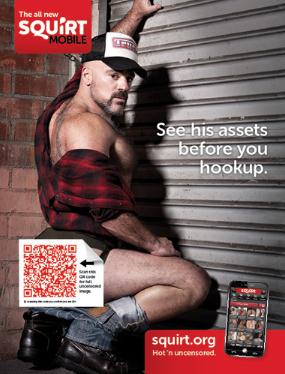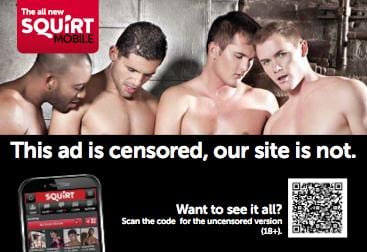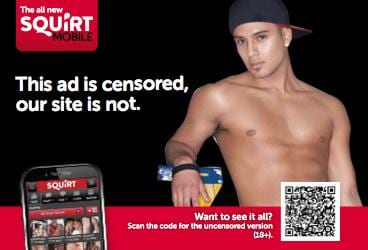
This ad was part of the first round proposed to CBS. CBS rejected it.

CBS rejected this Squirt ad.
There’s something profoundly ironic about Squirt’s new ad campaign, which reads, “This ad is censored, but our website is not.”
The joke is that the ads, too, were censored – in a way.
Squirt, which is owned by Pink Triangle Press, is a hookup site that helps gay men find partners and cruising spots. Squirt – like many similar sites – has recently moved toward a mobile model of location-based matching.
With a new crop of Grindr-inspired apps popping up, competition is becoming increasingly stiff. Sites like Manhunt and GuySpy have entered the fray, sparking a battle royale to capture Canada’s huge market for hookup, dating and cruising apps. With that comes a demand for increasingly aggressive advertising.
Previously, sites like Squirt relegated most advertising to gay-friendly publications and queer websites. But that changed when Manhunt put out a new billboard this past summer.
The ads were criticized by “family” groups – despite the fact they show only two men kissing. A racier campaign launched around the same time, from Vancouver-based GuySpy, featured nearly naked guys licking various sweets.
Jeffrey Freeman, media and traffic manager for Squirt, says the controversy whetted the Squirt team’s appetite to get in on the billboard business.
“They got a lot of flak,” he says. “But they got good PR out of it.
“We looked at what the competitors were doing, and we went in the middle.”
The battlegrounds were drawn. Squirt began submitting graphics for billboards in gay hotspots in Toronto, Ottawa, Vancouver and Montreal. The first round, sent to billboard conglomerate CBS, were fairly salacious. One featured a naked guy covered only by a QR barcode with the teaser “scan it and see the rest.”
CBS put the kibosh on that ad right away.
“They weren’t objecting to Squirt,” Freeman says. “It was the nature of the campaign they didn’t take to.”
That launched a “back-and-forth exercise to make it a little more cleaned up or G-rated,” he says.
But after the back and forth, Freeman realized the two sides weren’t about to come together. Squirt’s last submission featured four men, shoulder to shoulder, staring longingly downward. A black bar (representing censorship) covered most of the ad from the men’s chests down — leaving barely half a nipple visible. But it, too, was a non-starter for CBS.
In an email to Freeman, a CBS representative explained that they “do not feel comfortable posting the ad as is.”
Manhunt and GuySpy seemed to suffer a similar backlash. Freeman says the outcry over their – still PG-13 – ads has made billboard companies reluctant to take on clients from the gay dating scene.
That was the end of the road for Squirt, Freeman says. “We try to be as accommodating as possible, but we still have to be true to our brand.”
So Freeman says they kept the ad graphics and took to their blog to decry the censorship.
“We fundamentally don’t believe that the ad needed to change,” he says. At the same time, he doesn’t point the finger at homophobia on the part of CBS.
Michelle Erskine, director of marketing for CBS Outdoor, says the decision was not a gay thing.
“This isn’t directed at any one community or another,” she says.
Erskine says the process of accepting, or rejecting, an ad can be a very subjective and situational one. Both the proposed graphics and the complaints come across her desk, which means she was personally involved in dealing with the backlash from Manhunt and GuySpy’s ads – and rejecting Squirt’s.
“There’s no way I can limit who sees a campaign,” she says. “That’s the filter we run it through.”
She points to a similar campaign for Ashley Madison – a website that helps married people find extramarital encounters – that drew criticism, despite being completely G-rated.
She says CBS is always willing to look at new campaigns from sites like Squirt. “I wouldn’t say that we run a wholesale ban on anything.”
But she says that if the campaign makes anyone uncomfortable, she needs to incorporate those complaints.
Even though CBS hasn’t shut the door on Squirt, Freeman says Squirt’s new mix of advertising is probably not going to include billboards. While he underlines that Squirt ads will still appear in print, he says a new emphasis will be placed on events and viral content.
“We want to be able to go after our audience where our audience is.”


 Why you can trust Xtra
Why you can trust Xtra


